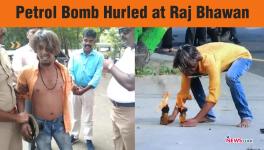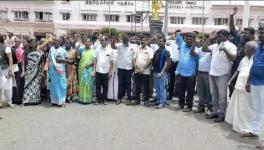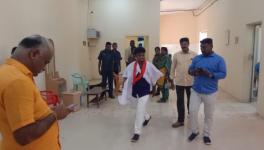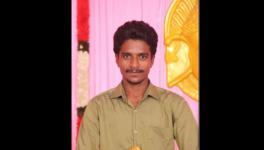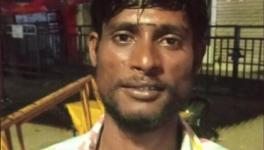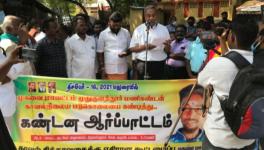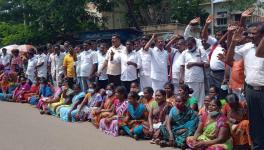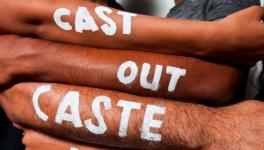Rural Development: Two Perspectives from Tamil Nadu
Representational use only.
Part I
An enterprising businessman has sought to develop a rural development project in his privately-owned land. He however has met with resistance from a jealous neighbour who by deploying his official connections has sought to grab a part of his land to obstruct his efforts to develop the project. The caste, class bureaucratic connections of the neighbour have come in the way of the businessman in his rural development efforts. The said land is located in Thethampatti Village, VT Patti Sub- Division, Dindigul East Taluk.
The neighbour resorted to violence through his henchmen in his attempt to grab a part of the land belonging to the businessman, who is a Dalit. The violence that took place in October 2020, resulted in serious injuries to the Dalit agricultural labourer and his partner. The culprits were Veerappan and Pandi, two upper caste individuals with connections in rural society and governance institutions.
Veerappan claimed, without legal basis, 27 cents out of the total of 1.8 acres of land belonging to the businessman in Madurai city. Revenue records have been manipulated to create a false claim of ownership by Veerappan of the above-mentioned land. The Village Administrative Officer and the Panchayat President allegedly colluded to establish the false claim by Veerappan. The real owner, who lives in Madurai, was kept in the dark about the developments.
On the day of the incident, the main culprit, Veerappan, accompanied by Pandi, trespassed on the land in question and physically attacked and caused serious bodily harm to the Scheduled Caste caretaker and his partner.
On hearing the news, the businessman rushed to the scene. He had received a legal briefing and made a police case under the SC/ST Atrocities (Prevention) Act of 1989 against the culprits. The manipulation and doctoring of revenue records had been carried out by the culprits with the connivance of lower-ranking officials of the revenue department supported by the politically-motivated local Panchayat officials. A prompt response from the police was called for but did not take place.
During our visit, we met the local DIG of police and the Investigating Officer. Unfortunately, the original Investigating Officer of the case, perceived to be a man of integrity, has been transferred out on administrative grounds. Both the culprits were identified and brought to the police station and confined till the arrival of the complainant. For some reason, the two culprits, guilty persons who attacked the Dalit caretakers of the land and committed serious offences against the victims, were not arrested.
This is a typical case of land-grab and police inaction that is witnessed in other parts of the country.
The major police irregularity in the case was the detention in the police station of the accused for a long period without any arrest and their subsequent release in dubious circumstances amidst the allegations of police corruption.
Violence against the Dalits is prohibited by law. Broader administrative and police collusion, in this case, shows the “structural interaction” between the rural power structure and the police against the rural poor. The matter was brought to the notice of the Director-General of Police of the state, who has promised necessary action.
Such a structural interaction between the rural power structure and the local police is common in the northern parts of India. It called for a radical response by the local authorities, which did not occur.
Part II
My second perspective on rural development in Tamil Nadu is the story of a remarkable social activist and organiser, M. Muthusamy (born in 1953), who set up a voluntary organisation named ECHO TRUST (Education and Community Health Organisation Trust) in October 1985 at village M. Vadipatti in the Dindigul district of Tamil Nadu.
Echo Trust has sought to make a qualitative difference to the life of the rural poor in the area where Muthusamy lives in the same district: it is an intrinsically hostile social environment dominated by upper caste-elite class interests, which seek to suppress or co-opt any emerging rural socio-political resistance or assertion.
M. Muthusamy has told his own story of struggles and assertions for justice in a remarkable and rather unusual 160-page autobiography written by the author in the Tamil language, titled, ‘Neenga Ninaivuhal’ (Unforgettable Memories), published by Janani Publications, Chennai, in 2020.
It is not often that a former rural agricultural labourer such as the author of this book puts down his thoughts in writing in an organised fashion. The book is of deep interest and relevance to all and is currently being translated into the English language. It will likely attract a wide readership and response.
The author was born in a family of agricultural labourers in a tiny village in the Madurai district. His book is of 13 chapters and begins with a description of his poverty-stricken background. An employment opportunity came to the author at the early stages of his primary education, but the educational process itself ended after his high school education. The author was ready to accept any kind of employment.
Even though his working life was strewn with insurmountable problems, the author displayed tenacity and resistance in overcoming them. He found happiness in a successful inter-caste love marriage in 1977 with Tilakavathi. The story of the marriage is narrated absorbingly in chapter 6 (p.65). The rare inter-caste marriage found support from progressive political forces, which inclined the author towards progressive causes.
In 1976, the author found a new path in life in the health sector and joined RUSHA (Rural Unit for Health and Social Affairs), an outfit close to the Christian Medical College, Vellore. In 1981, he joined an organisation named REAL (Rural Education and Action for Liberation) and became a writer as well. By then, the author was the father of two sons.
In 1985, the author chalked out a new path by setting up his own rural community health organisation named ECHO TRUST, which is described in chapter 10.
The remaining three chapters elaborate on the recent activities of the ECHO Trust and explain its objective for fighting for people’s causes.
In 1987, the trust received funds from CAPART a central-government funding agency for rural development. The author moved to M. Vadipatti, which is the present location of the ECHO Trust.
This writer met the author and his talented partner in the early 1990s to support their activities in enhancing the quality of life of the rural poor in Tamil Nadu.
ECHO Trust continues to work on projects with a people-centric and Gandhian development approach. The example set by Muthusamy needs to be multiplied to expand rural development prospects in Tamil Nadu.
The writer was director-general of the State Institute of Public Administration and Rural Development in Tripura. The views are personal.
Get the latest reports & analysis with people's perspective on Protests, movements & deep analytical videos, discussions of the current affairs in your Telegram app. Subscribe to NewsClick's Telegram channel & get Real-Time updates on stories, as they get published on our website.









